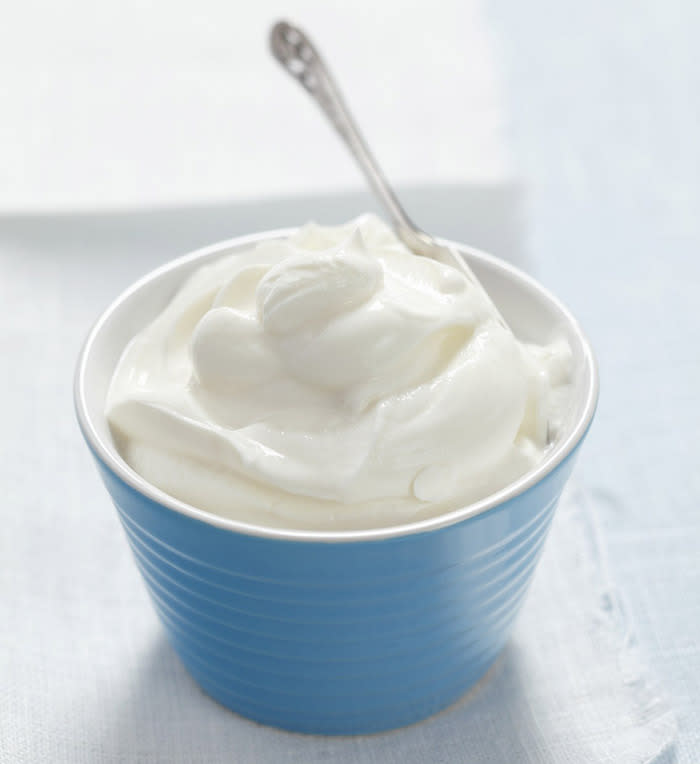Are These Yogurt Ingredients Safe to Eat?

Are the Chobani ads about other Greek yogurts accurate? (Photo: Corbis Images)
Chobani is going after ingredients in rival products with a slew of new ads for its Simply 100 Greek yogurt.
In one ad, a woman analyzes a container of Dannon yogurt poolside as a voiceover says, “Dannon Light & Fit Greek actually uses artificial sweeteners like sucralose. Sucralose — whyyy? That stuff has chlorine added to it.” (She tosses it in a used towel bin.)
Another ad shows a woman in a car investigating the ingredients list of a container of Yoplait yogurt. “Yoplait Greek 100 actually uses preservatives like potassium sorbate. Potassium sorbate — really? That stuff is used to kill bugs!” (She also pitches it.)
According to the Food and Drug Administration, sucralose is a “high-intensity sweetener” that is approved for use in food. “Sucralose is about 600 times sweeter than sugar,” the FDA says on its website.
Related: The Worst Diet Sodas You Can Drink
The FDA also lists potassium sorbate as “generally recognized as safe” when it’s used properly as a chemical preservative.
But are these ingredients we should be concerned about? Nope, Joan Salge Blake, a spokesperson for the Academy of Nutrition and Dietetics and a nutrition professor at Boston University, tells Yahoo Health.
“Sucralose is a sugar substitute, and there are several that have been approved by the FDA,” she says. Other substitutes that are in the same FDA category: Aspartame, saccharin, and monkfruit extract, which Chobani 100 uses. (You might recognize sucralose better by its brand name, Splenda, which shows up in candies, diet sodas, and a variety of sweet products.)
Related: 4 Diets That Are a Waste of Money
Monkfruit extract and sucralose are “essentially the same thing,” says Blake. As for the chlorine claims, Blake says it’s not broken down by the body, so you essentially pee it out.
“Studies (most of which were done on mice) have not shown any correlation with sucralose consumption and cancer, and the research that has been done on humans did not find any negative effects of sucralose,” Alissa Rumsey, registered dietitian and spokesperson for the Academy of Nutrition and Dietetics, tells Yahoo Health. “It is likely safe in small amounts.” However, Rumsey notes, sucralose gives foods a very sweet taste and having it too much can actually cause you to crave more sweets.
Potassium sorbate, on the other hand, is a preservative used to keep mold and yeast from growing in a variety of foods, including cheese, wine, dried meat, processed fruit drinks, and some baked goods.
Related: Don’t Believe the Headlines: Artificial Sweeteners Not Conclusively Better Than Sugar
“While it isn’t necessarily bad for our health, potassium sorbate is often found in highly processed foods, which should be kept to a minimum in our diets,” says Rumsey.
The claim that potassium sorbate is used as a pesticide is scary (and true), but a U.S. Environmental Protection Agency link that Chobani provides on its website calls it a “minimum risk pesticide product.” Among other minimum risk pesticide products listed on the page that can also be used in food: cinnamon, cloves, garlic, and peppermint, all of which most people wouldn’t be concerned about eating.
Despite the information, Blake points out that consumers can ultimately decide whether or not they want to eat products that contain these ingredients. “If you don’t want to use it, have products without it,” she says. “It’s great that there are options.”
Let’s keep in touch! Follow Yahoo Health on Facebook, Twitter, Instagram, and Pinterest.

